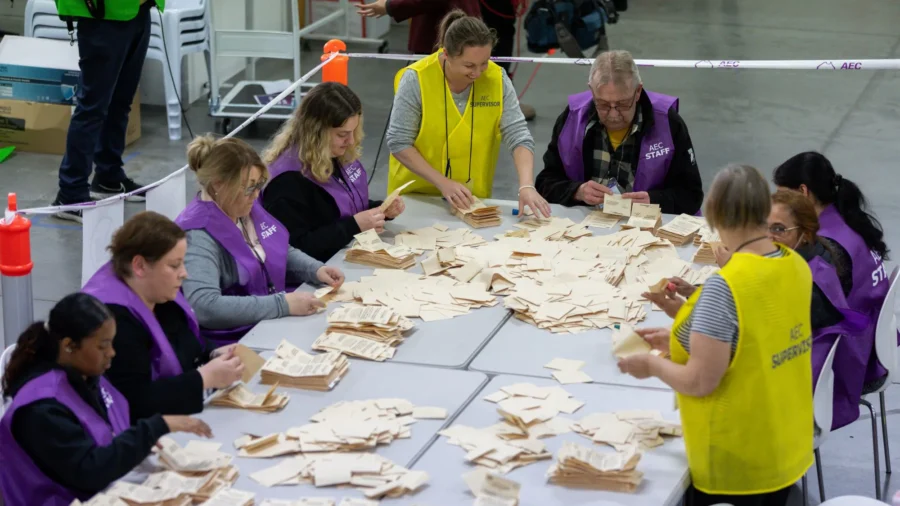Australians have emphatically rejected a change to the country’s Constitution with ongoing counts of the national referendum indicating more than 50 percent of voters have sided against the “Indigenous Voice to Parliament.”
The Voice referendum which was held Oct. 14 is a proposed amendment to the Australian Constitution that would establish a constitutionally enshrined Aboriginal and Torres Strait Islander Voice.
A successful referendum requires a majority of the eligible population to support the proposal, and a majority of states to also be supportive.
However, as of 8:10 p.m. AEST, several states have already declared “No” to The Voice with ongoing counting indicating the “Yes” vote is unlikely to catch up.
The Voice proposal involves altering the Constitution to embed a near-permanent advisory body into government that will have the power to “make representations” to the executive and legislature on all matters deemed relevant to Indigenous people.
Another less contentious part of The Voice is to change the wording of the preamble of the Constitution to include recognition of Aboriginal and Torres Strait Islanders.
Members of the advisory body will be elected by Indigenous communities around Australia—the exact number of members was not clear and was supposed to be decided after the vote was successful.
The Results Thus Far
As of 8:30 p.m. AEST, ongoing vote counts indicate 56.7 percent of Australians have rejected The Voice and 43.3 percent in support.
In the country’s most populous state, New South Wales, 56.8 percent of citizens voted No against The Voice, with 43.2 percent voting Yes.
In Tasmania, 59.3 percent have voted No, with 40.7 percent voting Yes. About 61.3 percent of voters in South Australia have chosen No against 38.7 percent.
While Queensland, Australia’s third-most populous state, and the Northern Territory—with its high Indigenous population—have also overwhelmingly backed the No vote, at 64.6 percent (Queensland), and 65.1 percent (Northern Territory).
Only the Australian Capital Territory showed strong support for the Yes vote with 64.7 percent approving The Voice, and 35.3 percent.
Victoria’s vote is still too close to call, and counting for Western Australia has yet to begin (the state is three hours behind the eastern states because of daylight savings).
Across the country, the highest support for the Yes case generally came from the inner-city electorates, but even strong Labor-held electorates not in immediate proximity to the CBD voted No.
One example is the electorate for Labor’s Indigenous Minister Linda Burney, Barton in the southern Sydney area, with 55.97 percent of voters rejecting The Voice
“Whatever the result tonight, millions of Australians have united in an historic movement for constitutional recognition of Indigenous Australians,” she wrote on X (formerly Twitter) on Oct. 14.
Of the 44 referendums Australia has held since 1901, only eight have passed, with the most recent referendum in 2017 to legalise gay marriage.
Counting for the vote continues.
Reasons Why People Voted ‘No’
In the days leading up to the referendum, a final Roy Morgan poll on The Voice conducted from Oct. 2 to the 12 showed 54 percent of those surveyed planned on voting No with 46 percent set to vote Yes.
One concern about The Voice has been the lack of detail about the model, the specifics of how it would operate in relation to the Parliament, and its scope of power (some terminology used in the proposed model could have wide interpretations).
Another concern was embedding the Voice into the Australian Constitution. If it was found not to be fit-for-purpose like previous Indigenous representative bodies, it would make it near-impossible to remove, requiring another referendum in the future.
A third concern was how adding another bureaucratic body would assist Indigenous Australians in areas such as self-determination, particularly when existing Indigenous-focused ministers, government bodies, and lobby groups have struggled to “close the gap.”
Prominent Australians who supported the No vote included former Prime Ministers Tony Abbott and John Howard.
Other notable Australian public figures include media personality Alan Jones, Indigenous leaders Warren Mundine and Senator Jacinta Price, former Woolworths CEO Paul Versluis, former Virgin Australia CEO John Borghetti, and former CEO of Qantas Geoff Dixon.
The High Profile Campaign for Yes
The Yes campaign benefitted from support from an array of high-profile individuals and some of Australia’s largest organisations and companies.
Reasons that people indicated they voted Yes include the belief that The Voice was a necessary tool for improving outcomes for Indigenous Australians in areas such as health, education, employment, and housing.
Some notable supporters include former Prime Ministers Malcolm Turnbull and Paul Keating; sports stars such as Cathy Freeman, Adam Goodes, and Nathan Buckley; as well as entertainers including Russell Crowe, Hugh Jackman, Naomi Watts, and Missy Higgins.
The country’s largest businesses, like Qantas and BHP, have also supported The Voice, as well as 20 of the country’s largest sporting leagues.
From The Epoch Times

